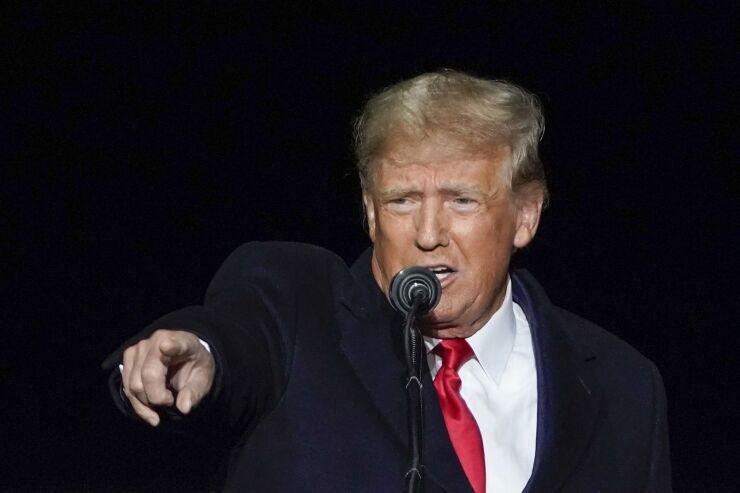Dozens of audit triggers litter Donald Trump's tax returns, according to Congress's top nonpartisan tax lawyers: questionable private jet expenses, large unsubstantiated charitable deductions and dubious payments to the former president's children, among others.
Yet none of them have been seriously audited, according to a new
The analysis from the Joint Committee found that Trump was able to use questionable deductions and aggressive tax strategies to minimize his tax bills. The data also showed that Trump and his businesses lost tens of millions of dollars while he was running for president and after he entered the White House.
Among the items the report says should merit scrutiny are tens of millions of dollars in deductions claimed by Trump and his companies, including for business expenses incurred while president and $126.5 million in write-offs over five years tied to sales from an entity that didn't appear to be selling anything.

Another issue flagged was a $21.1 million deduction for a conservation easement at Trump's Seven Springs property in New York's Westchester County. That issue has been the subject of a fraud lawsuit filed by New York Attorney General Letitia James earlier this year, which Trump has dismissed as a political attack.
In a release late Tuesday, House Democrats said Trump's resistance to transparency — as well as the Internal Revenue Service's lackadaisical approach to its policy of annual audits for presidents — are to blame for the former leader potentially breaking U.S. tax laws that he took an oath to uphold.
The report, which culminates the House Ways and Means Committee's more than three-year-long effort to obtain Trump's tax returns, was made public after the committee voted on party lines to release the information. The actual tax returns, which include hundreds of pages of Trump's personal and business filings for the years between 2015 and 2020, will be released in redacted form in the coming days.
House Ways and Means Chairman Richard Neal, who led the effort to investigate Trump's tax returns and the IRS's presidential audit program, said he is introducing a bill that would legally require the agency to audit every president within 90 days of taking office.
Trump long said he would be happy to release his taxes but that he wasn't doing so on the advice of lawyers because he was being audited.
While House Democrats won their lengthy legal battle to obtain Trump's tax returns after he exhausted all his legal options, any political benefit for Democrats may be largely muted as most voters have already hardened their stances on Trump. Moreover, bigger controversies and other storylines have come to the fore in the past three years.
That period includes two impeachments and acquittals: one for seeking assistance from Ukraine to discredit his Democratic political rivals and the second for his role in the Jan. 6 Capitol attack. Over that time Trump also lost his second bid for the presidency, was blamed for the poor showing of Republicans in November's midterm elections and hosted a controversial racist commentator at his Mar-a-Lago estate.
And this week, the Democratic-led House panel investigating the Jan. 6 insurrection held the last of a series of high-profile hearings that culminated in criminal referrals for Trump to the Department of Justice.
"He was impeached twice and he still almost won, so is this going to damage him? I'm not sure," Representative Jimmy Gomez, a California Democrat, said in an interview.
Once seen as impervious to controversy, the former president now has legitimate Republican challengers waiting in the wings for 2024, a group expected to include Florida Governor Ron DeSantis, who has outpolled Trump in at least one recent survey.
Cautious approach
Nonetheless, Democrats said the airing of Trump's taxes was important for transparency and democracy. And Gomez said the political implications aren't important because the goal is to chronicle the IRS audit program's shortcomings and how it can be strengthened, he said.
Throughout the process, Neal's more cautious approach to his investigation has grated some of his more progressive colleagues. That was especially true as Democrats came to believe that Trump's team would try to stretch out the legal process, dimming hopes that they would get the documents before the 2020 presidential election.
At the same time, Neal and other Democrats say they have been cognizant of the potential of overplaying their hand — and aware that intentionally or unwittingly releasing the information without the committee's authorization is a felony that could put someone behind bars for up to five years.
'Nearly unlimited'
Representative Kevin Brady, the committee's top Republican, said that disclosing Trump's tax information sets a dangerous precedent for taxpayer privacy, but he declined to say Tuesday whether Republicans would opt not to use their power to request and release tax returns when they are in control of the panel next year.
Brady said the power of the congressional tax committee chairs is "nearly unlimited" in light of this new precedent.
Neal defended the decision to release Trump's tax returns, saying that the committee has operated in good faith and with the utmost professionalism and that the process wasn't designed to be "malicious" toward Trump.
"Our goal is not to politically damage Donald Trump for seeking re-election," Gomez said. "We're doing this to hopefully bring some more balance and accountability to the presidency."
Neal said Trump's tax documents would be released in the coming days, once personal information such as Social Security numbers have been redacted. Democrats have until Jan. 3 to release more information, at which point they will lose their majority in the House.





